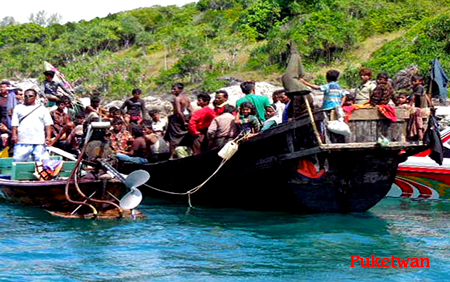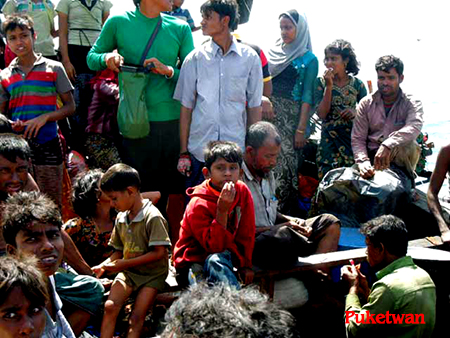The ASEAN Inter-Parliamentary Myanmar Caucus (AIPMC) called on Thai authorities to give United Nations refugee agencies unhindered access to Rohingya boat migrants to determine whether or not they are asylum seekers, and if they are eligible for refugee status, according to a recent statement.
 The AIPMC requested that “Thai authorities should suspend plans to deport at least 73 Rohingya migrants back to Burma”. Kraisak Choonhavan the AIPMC Vice President said: “Thailand has a history of mistreatment of Rohingya refugees, and their push-back, or ‘help on’ policy is clearly not in keeping with international human rights standards. Thailand must not send any Rohingya back to Myanmar until the UN refugee agency has had an opportunity to interview them and ascertain their refugee status.”
The AIPMC requested that “Thai authorities should suspend plans to deport at least 73 Rohingya migrants back to Burma”. Kraisak Choonhavan the AIPMC Vice President said: “Thailand has a history of mistreatment of Rohingya refugees, and their push-back, or ‘help on’ policy is clearly not in keeping with international human rights standards. Thailand must not send any Rohingya back to Myanmar until the UN refugee agency has had an opportunity to interview them and ascertain their refugee status.”
Ironically, Malaysian authorities regularly give UNHCR access to incoming Rohingya migrants, and those who are screened and designated as qualifying for refugee status are released from immigration detention, according to the statement. But in the recent case the Thai authorities have detained about 73 Rohingya migrants – including 14 women and 16 children, some as young as 3 – after their boat was deemed not seaworthy, and many passengers too weak to endure the last leg of the long journey to Malaysia’s Langkawi Island. Thailand plans to return them to Burma, where they are also denied citizenship and will likely to suffer under harsh treatment from local authorities. Rohingya are accused of being illegal immigrants and as a result have suffered under the past and current Burma governments.
 Eva Kusuma Sundari, AIPMC president and Indonesian member of parliament, said: “As a member of ASEAN, Thailand has a responsibility to safeguard the human rights of any people in its territory, including illegal immigrants who may be asylum seekers.”
Eva Kusuma Sundari, AIPMC president and Indonesian member of parliament, said: “As a member of ASEAN, Thailand has a responsibility to safeguard the human rights of any people in its territory, including illegal immigrants who may be asylum seekers.”
“Sending these Rohingya back to Myanmar is likely to put them at increased risk of rights abuses, including falling prey to unscrupulous human traffickers who prey on the destitute and desperate. Within ASEAN we are working hard to try and put an end to the curse of human trafficking, and to eradicate modern day human slavery in our region. By forcibly returning these Rohingya asylum seekers, Thailand is inadvertently increasing the likelihood that they will fall into the hands of human traffickers. Instead, the UNHCR are willing, capable and mandated to screen these people and ascertain whether they qualify for refugee status or not. This is the only right step to take in this situation.”
AIPMC also reiterates its concern over reports from southern Thailand that human traffickers, in collaboration with Thai and Malaysian state officers, are exploiting Rohingya refugees fleeing persecution in Burma as they try to pass from Thailand to Malaysia. Press reports have suggested that hundreds of desperate Rohingya refugees are being held in inhuman conditions by traffickers demanding extortionate amounts to sneak them across the border into Malaysia where they wish to seek asylum.
Thai authorities should allow the United Nations High Commissioner for Refugees (UNHCR), the UN refugee agency, unhindered access to these and other boat migrants from Burma’s Arakan State to determine whether they are seeking asylum and whether they are qualified for refugee status, according to the statement.



